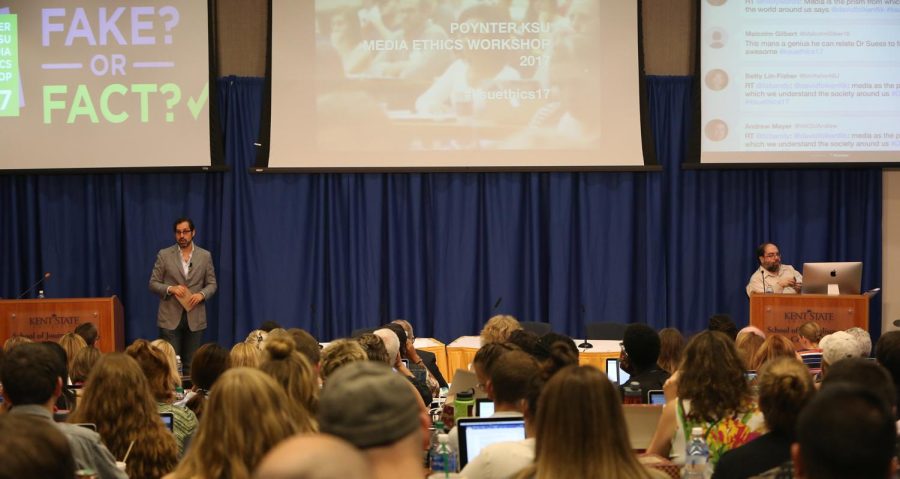Poynter’s ‘Fake or Fact?’ ethics workshop addresses fake news dilemma
September 21, 2017
“Fake news forces news organizations back on their heels to defend themselves. … distracts from what’s actually happening,” said David Folkenflik, an NPR media correspondent and keynote speaker at this year’s Poynter Media Ethics Workshop. “It takes good journalism, to follow bad journalism, to follow fake news.”
The 13th annual ethics workshop titled, “Fake or Fact?” focused on combating the growing frequency of fake news, and was held in the FirstEnergy Auditorium in Franklin Hall Thursday.
The training event explored the extraordinary effect of fake news on media and those who consume it.
The day-long workshop has been coordinated by Jan Leach since 2004. Leach, an associate professor at Kent State and the director of the Media Law Center for Ethics and Access, aims for the workshops to provide a setting for students, professionals, and educators to discuss critical issues on journalism and media ethics . the workshop was moderated by faculty from the Poynter Institute. The institute, which focuses on ethics, has been serving as a center for journalism education since 1975.
Since 2004, Leach has coordinated the workshops that aim to provide a setting for students, professionals and educators to discuss critical issues on journalism and media ethics.
This year’s workshop tackled the influx of fake news during the 2016 presidential election, identifying fake news and how public relations should handle clients that are targets of it.
Folkenfik said while the 2016 election cultured a lot of fake news, it wasn’t the birth of it. Some examples include stories claiming that President George W. Bush wore a wire or that former Secretary of State John Kerry committed war crimes while serving in Vietnam.
However, with today’s technology and 24-hour news cycles, it has become easier for fake news to grow and accumulate compared to the past.
Abigail Winternitz, a junior public relations major, said she has experience with fake news.
“I always get those alerts that a famous celebrity has died,” Winternitz said. “It happens all the time and people believe them.”
A heavily-discussed theme of the workshop was how the current presidential administration is upholding and enabling fake news, which is another sentiment shared by students like Caitlin Albright, a junior public relations major.
“Donald Trump,” said Albright, who thinks of the president when she hears about fake news. “And news being published that isn’t what the subject wants.”
Folkenflik agreed with Albright and said not only does Trump participate in the enabling of fake news, but his relationship with media wanes the power of journalists, too.
“Let’s be very clear that there’s nobody who loves the media more than the president, as long as the media is being laudatory of the president,” Folkenflik said. “If he’s attacking the press, his never-ending supporters will stick with him, truly revealing the mood ring of the occupant of the Oval Office.”
Damaso Reyes, the program manager of the News Literacy Project in New York City, advised people should take what they see, think about it and educate themselves before jumping to conclusions.
“Maybe seeing was never believing, but definitely in the 21st century, seeing is not believing,” Reyes said.
Featured on the panel with Folkenflik and Reyes was Alicia Calzada, an associate in the Business Litigation Practice Group, who stressed the importance of examining accuracy and truth behind photos, and always standing by the fail-safe method of checking sources.
“Am I seeing this image on social media?” Calzada asked. “That should be an immediate red flag — if there’s no credit or no source.”
Public relations professionals are no exception to fake news. The workshop addressed Kellyanne Conway and Sean Spicer, specifically controversy surrounding them because of their attitude toward fake news.
These two were not ignored when Michele Ewing, a Kent State associate professor who teaches public relations, and Chas Withers, the CEO of Dix and Eaton, discussed public relations and what happens if a client is the subject of fake news.
“The Kellyanne Conways of the world are not practicing ethical public relations,” Ewing said.
Ewing said honesty and transparency are key in public relations.
After five sessions and nearly eight hours of discussion, the workshop concluded with Leach announcing next year’s workshop topic: the opioid epidemic.
Lauren Garczynski is the CCI reporter. Contact her at [email protected].












